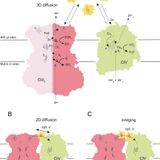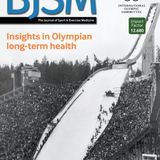RECENT ARTICLES

Cryo-EM structure and kinetics reveal electron transfer by 2D diffusion of cytochrome c in the yeast III-IV respiratory supercomplex
Edited by Yifan Cheng, University of California, San Francisco, CA, and approved January 19, 2021 (received for review October 11, 2020)In the last steps of food oxidation in living organisms, electrons are transferred to oxygen through the membrane-bound respiratory chain. This electron transfer is mediated by mobile carriers, such as membrane-bound quinone and water-soluble cytochrome c. The latter transfers electrons from respiratory complex III to complex IV. In yeast, these complexes assemble into III2IV1/2 supercomplexes, but its role has remained enigmatic. This study establishes a...…Edited by Yifan Cheng, University of California, San Francisco, CA, and approved January 19, 2021 (received for review October 11, 2020)In the last steps of food oxidation in living organisms, electrons are transferred to oxygen through the membrane-bound respiratory chain. This electron transfer is mediated by mobile carriers, such as membrane-bound quinone and water-soluble cytochrome c. The latter transfers electrons from respiratory complex III to complex IV. In yeast, these complexes assemble into III2IV1/2 supercomplexes, but its role has remained enigmatic. This study establishes a...WW…

High genetic contribution to anterior cruciate ligament rupture: Heritability ~69%
Article TextOriginal researchHigh genetic contribution to anterior cruciate ligament rupture: Heritability ~69%Objectives We aimed to determine the lifetime genetic risk for anterior cruciate ligament (ACL) rupture.Methods We used a twin study approach, linking the Swedish Twin Register with national healthcare data to form a 30 year, population wide, longitudinal twin cohort. We studied ACL rupture in this cohort of 88 414 identical and fraternal twins, aged ≥17 years, to determine the familial risk and heritability of ACL rupture.Results The incidence rate of ACL rupture was 70 (95% CI 66...…Article TextOriginal researchHigh genetic contribution to anterior cruciate ligament rupture: Heritability ~69%Objectives We aimed to determine the lifetime genetic risk for anterior cruciate ligament (ACL) rupture.Methods We used a twin study approach, linking the Swedish Twin Register with national healthcare data to form a 30 year, population wide, longitudinal twin cohort. We studied ACL rupture in this cohort of 88 414 identical and fraternal twins, aged ≥17 years, to determine the familial risk and heritability of ACL rupture.Results The incidence rate of ACL rupture was 70 (95% CI 66...WW…
- Total 2 items
- 1